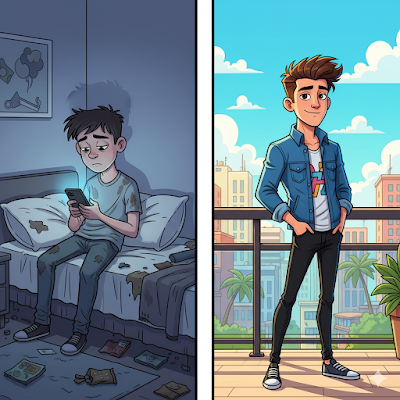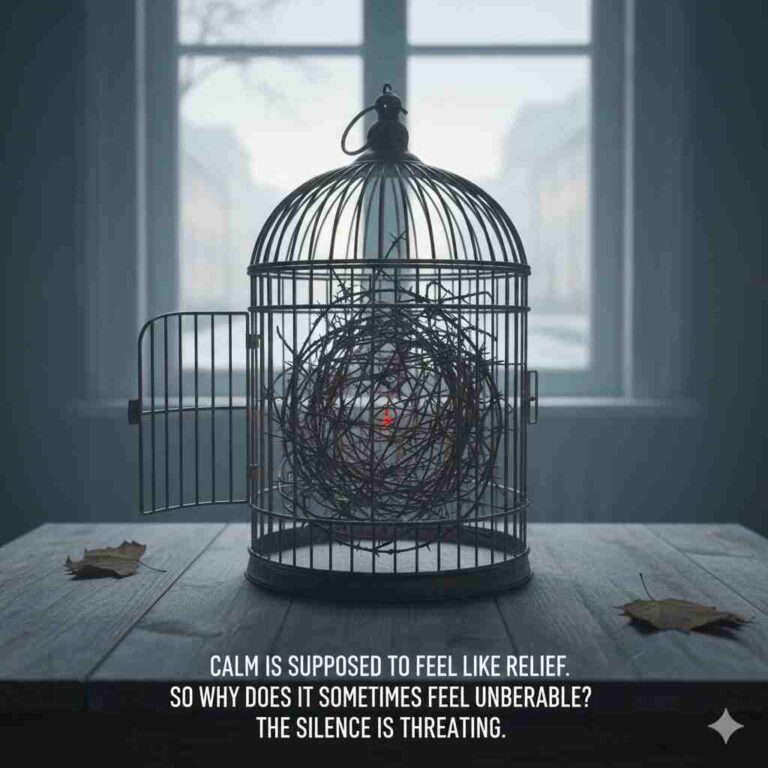Why We Pretend Online: Dark Humor, Digital Masks & the Neuroscience Behind It
Have You Ever Pretended to Be Someone Else Online?
I’ll be real — I have. 💡
Not in some chaotic-catfish way, just curiosity. I once swapped my profile name, pic, and tone in a group chat, just to see what shifted. It shocked me how little it took. A few emojis, a different vibe, and suddenly I wasn’t me anymore — just Wi-Fi and imagination.

Online Deception and Maladaptive Humor: Shocking Truths That Fog Our Minds
That moment stuck with me.
In a world where trust gets shattered hourly, becoming someone else online is basically self-deception with better lighting.
I’m Minhan, and I write at Readanica.
Let’s walk through how digital identity and humor mess with our minds — and why it matters more than we think.
💡 When Filters Rewrite Reality—The Viral Japanese Guy:
Remember that viral “Japanese biker girl”?
Millions followed her Yamaha rides, vibing with her confidence, her stories, her aesthetic.
Then a livestream glitch dropped the filter.
She wasn’t a woman at all — just a middle-aged man using FaceApp.
The internet gasped, then laughed, then scrolled on.
But the lesson didn’t.
Psychologist Sherry Turkle said digital life lets us “edit the self.”
That guy didn’t lie to trick people — he lied to be seen.
We do it too.
We soften angles, retouch flaws, rephrase ourselves into the version we hope won’t get judged.
This is the new mask.
Not deception — survival.
💡 Why We Fake It Online?
Most online deception isn’t catfishing — it’s micro-curation.
Tiny edits. Polished moments.
The “best self” we think the timeline wants.
Carl Jung called this the persona — the mask we show society.
The internet just turned that mask into a customizable skin.
Research from the Journal of Social and Personal Relationships shows people use social platforms to test identities they can’t express offline. Almost like emotional cosplay — trying on versions of ourselves to see which ones people clap for.
But applause ≠ connection.
Likes don’t hug back.
A one-liner for this whole phenomenon is written as under:
“Inner Echoes — when you actually become what you’ve been wanting yourself to be.”
It fits the psychological process called internalization, when repeated performance becomes actual identity.
💡 How Humor Becomes A Coping Mechanism?
Dark humor memes, meltdown edits, those “me trying to stay positive while mentally imploding” TikToks — that’s our generation’s emotional language.
A 2020 study in Personality and Individual Differences found dark humor actually buffers stress. It drops cortisol, bumps dopamine, and reframes pain so it feels survivable.
Related: From Crying Emojis to Dark Memes: Why Gen Z Laughs Through Stress
The 😭 emoji.
The unhinged TikTok sound.
The “this is fine” dog.
They are all modern pressure valves.
Have you ever been there?
I’ve been there too — 3 a.m., scrolling, feeling numb, then a meme hits so stupidly accurate I start laughing.
Not because the pain’s gone.
But because someone else felt it too.
That’s digital empathy.
💡 The Quietest Deception: Faking Peace Online
Sometimes the fakest thing about us online isn’t our face — it’s our calm.
Some post “self-care Sunday” while burnout claws through our ribs.
Other tweet jokes instead of confessions.
We meme our way around heartbreak.
Psychologists call this surface acting — the labor of pretending emotions you don’t feel.
The APA’s 2021 Stress in America report found that Gen Z is the most stressed generation, but also the most expressive online.
So the mismatch becomes content:
Anxiety jokes trend while real anxiety hides in drafts.
💡 Why We Crave the Filter? Real Neuroscience:
There is brain science behind it:
The Dopamine Loop
Likes, comments, shares — each one triggers a dopamine micro-spike in the mesolimbic reward pathway (specifically, the nucleus accumbens).
The brain learns very fast:
online approval = safety.
So deleting a post that flops?
It feels like erasing failure because the brain processes social rejection and physical pain in overlapping neural circuits — especially the dorsal anterior cingulate cortex.
Self-Presentation Stress
Jonathan Freedman described self-presentation as a constant negotiation between authenticity and acceptance.
Online, algorithms intensify that negotiation — reward polish, punish vulnerability.
So we trim identity into the shape that performs best.
💡 When the Screen Becomes a Mirror
After the Japanese biker reveal, something interesting happened.
People weren’t all mad.
Some said they still liked him — his stories, his travels, his perspective.
It exposed a truth we hate admitting:
We believe what feels good.
We trust what fits a narrative we already want.
Every fake personality we encounter becomes a mirror:
How much of our own online self is performance?
💡 How Humor Reveals Hidden Stress?
Scroll long enough and you start seeing a pattern:
Memes are basically public diaries in disguise.
“Me pretending to have my life together” memes?
That’s confession of being wretched dressed as comedy.
Therapists call this cognitive reframing — turning distress into humor so it becomes shareable, tolerable, and communal.
That’s why “depressed meme pages” thrive.
Not because people want to stay sad —
because laughing about sadness feels safer than saying it out loud.
💡 Maladaptive Humor—When Jokes Start Hiding Pain
But humor has a shadow side.
When jokes become the only coping strategy, psychologists call it maladaptive humor.
A 2017 study in Cognitive Processing linked heavy dark-humor reliance to emotional suppression — not expression.
It’s not that dark jokes are bad. It’s just:
Pay attention when humor stops connecting you to people and starts walling you off.
The internet teaches us to aestheticize pain:
“crying but make it aesthetic” videos.
It’s quiet suffering turned into content. It’s bleeding through silence.
💡 Taking Off the Virtual Mask
The fix isn’t quitting the internet or deleting social media.
It’s digital intention.
Ask yourself before posting:
“Is this for validation or connection?”
Related: Try this Challenge to Quit Scrolling
Psychologists recommend digital self-awareness or mindfullness—checking in on how online behavior shapes mood. A 2022 Frontiers in Psychology paper found that mindfulness in digital spaces (pausing before posting, observing emotion) reduces anxiety tied to social media use.
Touch grass, sure.
But touch your heart too.
💡 The Resilient Human Underneath
Here’s the part that keeps me hopeful. Humans are absurdly resilient. We’ve clawed through iron ages, pandemics, heartbreaks, and algorithm changes. From stone tools to skyscrapers, from cave paintings to memes—we’ve always turned chaos into communication.
Related: Would You Hug Your Younger Self?
So no, a comment can’t define your worth. Believe me, a feed can’t measure your soul. The same brain that built rockets and symphonies lives inside you, and it deserves better than doomscroll despair.
When I feel lost in my own digital reflection, I remind myself: this device in my hand is a tool, not a judge. It’s glass, not gospel.
We can laugh through memes, we can bleed through silence, but we can also log off and breathe like the resilient species we are. The stranger we pretend to be online is still us—just trying to find a safe way to be seen.
And honestly — that might be the most human thing ever.
Disclaimer:
This article discusses psychological and cultural perspectives on online identity. Always consult licensed professionals for health concerns or psychological support.
If you are in the U.K., contact Samaritans at 116 123 (free, any time) or visit samaritans.org.
Outside the U.K., check local resources—you’re not alone.
💡 References and Further Reading:
American Psychological Association. (2021). Stress in America: Generation Z report. https://www.apa.org/news/press/releases/stress/2018/stress-gen-z.pdf
Frontiers in Psychology. (2022). https://www.frontiersin.org/journals/psychology/articles/10.3389/fpsyg.2022.1034495/full
National Library of Medicine: The Role of Light and Dark Humor in Predicting Depression, Anxiety, and Stress https://pmc.ncbi.nlm.nih.gov/articles/PMC10936143/
Samaritans. (n.d.). Helpline and mental health support. https://www.samaritans.org
Turkle, S. (2011). Alone Together: Why We Expect More from Technology and Less from Each Other. Basic Books.
https://psycnet.apa.org/record/2011-02278-000









